Fiery radiance (2-I part)
13 July 1942.
East Prussia.
Bet Hitler's "Wolfschance."
Huge gray walls of dozens of bunkers and other fortified buildings, lost in the densely impassable forests among the Mazury lakes and marshes, made a simultaneous majestic and depressing impression. Here, not far from Rustenburg, on the total area of over 250 hectares, the Fuhrer's main headquarters was located, which he called his Wolf Wolf (Wolfschants). Bunkers stakes surrounded several solid rings of barbed wire obstacles, minefields, hundreds of observation towers, machine-gun and anti-aircraft gun positions. Camouflage nets and models of trees reliably hid these structures from detection from the air, and strict access control to the area of its location from unwanted land visitors.
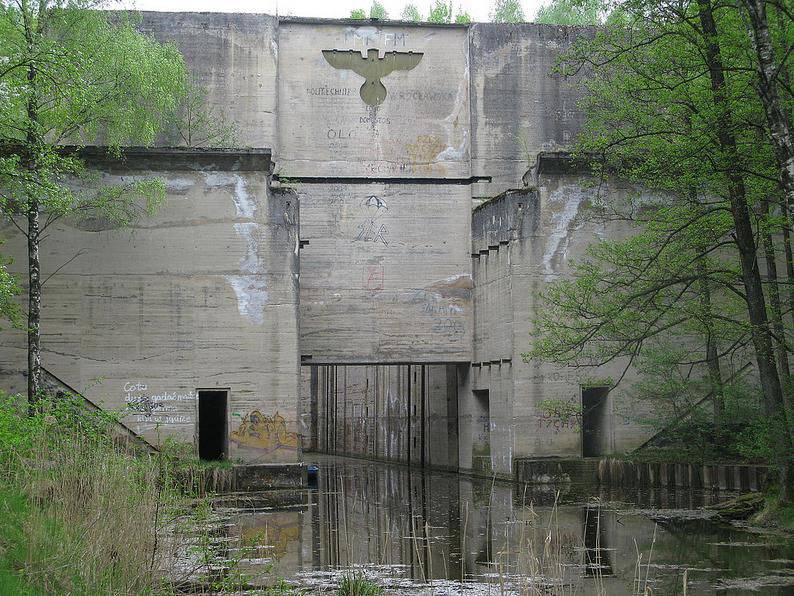
The bins of the Wolf's Lair reach heights of 20 meters (excluding their underground part)
If urgent trips were needed, Hitler always had an airplane and his personal train at the nearby aerodrome and railway station. Here, for the convenience of managing military operations, the headquarters of the Main Command of the Ground Forces was stationed. Proving their loyalty and every minute willingness to comply with the instructions of the Fuhrer, many high-ranking Reich officials, including the Reich Minister of the Interior, Heinrich Himler, located their headquarters on the territory of the headquarters. Reich Minister of the Imperial Ministry aviation Hermann Goering decided not to stop only at his residence, placing here also the headquarters of the Air Force High Command.
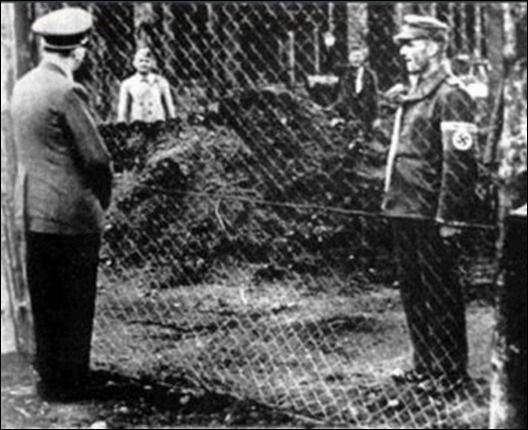
Hitler personally inspected the construction of his bet
On the well-lit, but damp corridor of one of the stakes bunkers, the chief of staff of the Wehrmacht Army High Command, Colonel-General Franz Halder, walked. His duties included, among other things, daily reporting to the Führer on the situation on the fronts. The exceptions were the days when Hitler was away, or for various reasons he refused to listen to Halder's report. Turning the corner, he approached the entrance to the office of Hitler. The duty officer of the SS, stretched out “to the string” in front of the chief of staff, clearly reported:
- Mr. Colonel-General, the Führer is waiting for you.
Halder entered the office. At the head of the table, studying a document, sat Hitler. He looked up from a piece of paper lying in front of him and, taking off his small glasses, looked at the person who entered.
- Well, what did you cook for me today, Halder? - He said, nodding in response to the greeting of the chief of staff.
Going to the table and laying out his large cards on it, Halder prepared for the report. Hitler rose from his chair and walked closer to him.
“My Fuhrer, our operation in the south is developing non-stop,” he began. - While the enemy is still holding on to the Taganrog sector, his main forces were compressed as a result of concentric strikes tank Kleist’s army and the 6th army from the west and north. The 4th Panzer Army comes to his rear. With advanced units (3rd Panzer Division), it has already reached Kamensk and is deploying here, along with the tank and motorized divisions of the second echelon that came here during the operation. We also conduct serious and successful tank battles northwest of Voronezh.
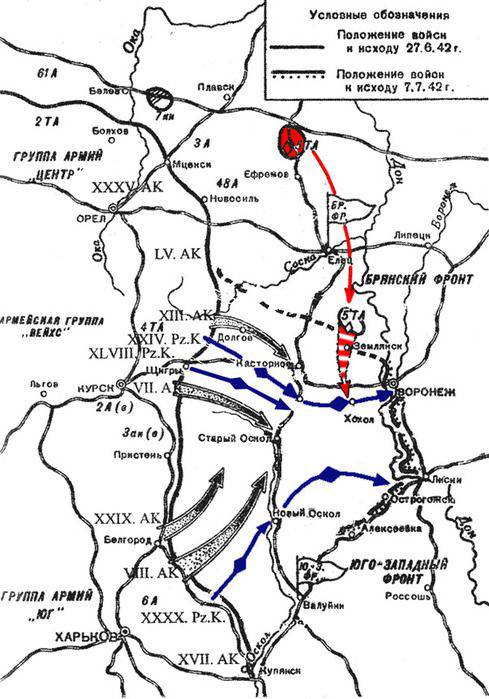
The scheme of hostilities in the South-Western Front, in the period from 27.06.1942. on 13.07.1942
- How long will these “heavy and successful tank battles” continue? - Hitler angrily interrupted his report. “We have forgiven Boca the catastrophe near Moscow, appointed the commander of an army group at the most crucial sector of the front to conduct our decisive offensive in the south, and to complete his army, we practically“ divided ”the tank divisions of the Army Group Center, withdrawing from each of them a full-fledged tank battalion! - furiously shaking hands, cried the Fuhrer. - We gave him the most modernized tanks T-III and T-IV, equipped with additional armor and long-barreled guns, which even from large distances now do not leave chances for the Russian T-34 and KV! And what do I see in the end? Instead of surrounding the Russians with a blow along the Don, he was stuck in battles near Voronezh, and the Russian divisions quietly leave through the Don and organize their defenses on its east coast !!! - Hitler several times hit the edge of his hand on the map, as if showing a new line of Russian defense. “I have said more than once that I don’t attach any importance to Voronezh and gave the army group the right to refuse to master it, if this can lead to too great losses, and von Bock not only allowed Goth to stubbornly climb Voronezh, but also supported him in this ! And at the same time our vaunted commander of an army group lacks the audacity to claim that his flank in Voronezh is attacked by almost a Russian tank army !!! Where did the tank army come from the advice ?! Thousands of Russian tanks see my generals everywhere, which prevent them from completing the assigned tasks! (5)
(5) - Hitler was wrong. July 6 The 1942 of the year began a counterstrike from only the recently formed 5 Panzer Army of the Red Army, under the command of Major General Alexander Ilyich Lizyukov. It was the first, created in the Red Army, an association of this class. The strike was carried out from the Yelets area on Zemlyansk-Khokhol and fell on the northern flank of the troops of the 4-th tank army of Hermann Goth, who had reached the approaches to Voronezh. In the battle 5TA was introduced in parts, as they arrive at the front line. Its main enemy was the 9-I tank division of the Germans, a veteran of the Eastern Front, advanced in advance by the 4TA command to defend its flank. The Germans defended themselves skillfully, inflicting heavy casualties on individual 5TA units, and after the reinforcements in the face of the 11 Panzer Division launched an offensive, inflicting a major defeat on the 5TA troops. As a result, due to heavy losses and loss of combat capability, in mid-July 5TA was disbanded, and her former commander A.Lizyukov died on July 23 1942 of the year, in a battle on his tank. However, despite the defeat of 5TA, including thanks to its counterattack, the German offensive lost the ability to quickly change to the infantry of the tank units it needed so much, eventually failing to close its “ticks” behind the departing divisions of the South-Western Front.
“My Fuhrer, but the enemy really attacked our northern flank at Voronezh with large forces, changing the 9 and 11 tank divisions was extremely difficult ...” the colonel general tried to object.
- Stop it, Halder! - Hitler interrupted sharply. - Where is the 23-I tank division, which came from the west and was linked by the enemy, the 24-I tank division, “Greater Germany”? Where, tell me, are there two other motorized divisions of the 4 tank army? Who, despite my demand, drove the 24 tank and the Great Germany division to Voronezh, thereby delaying their release? Von Bock, Sodenshtern?
Hitler stared at the Colonel-General. The chief of the German General Staff was silent. Now Hitler directly accuses the commander of Army Group South, von Bock, and his chief of staff, Georg von Sodenstern, for the failed release of tank and motorized divisions. Only the fact that it was Halder at one time, contrary to the headquarters of Army Group South, instead of their unsuccessful proposal to transfer the direction of the main attack to the enemy offensive, the plan of a previously prepared strike to the rear under Raisin now can save at least Zodenshtern.
“My Führer, the decisions at the headquarters of the army group are made by the commander,” Halder finally said. - Sodenstern well proved himself in the planning of our offensive, but now he simply obeys the orders given to him.
- Oh well. Then urgently prepare an order for the dismissal of Fedor von Bock, commander of Army Group South, ordered Hitler. Then, order the reassignment of the 4 tank army to Army Group A, with the task of preventing the enemy from retreating from the rear. Army Group "B", moving to Stalingrad, should at the same time cover the rear and flank of Army Group "A" during its attack on the Caucasus.
- Yes, my Führer.
“Okay, that's it.” What do we have in the center and in the north?
- In the center, after the completion of the operation “Seidlits” (6), we captured many prisoners. Only a few individual groups of the enemy managed to get out of the "boiler". Army Group North has nothing substantial — apparently the Russians have not yet recovered from their defeat during the battle of Luban.
(6) - “Zeidlits” was the last operation of the Germans, which was aimed at eliminating the consequences of the incursions of the Soviet troops after the counter-offensive near Moscow in the winter of 1941 - 1942. During this operation, the 9-I German army, as part of the 10-ti infantry and 4-x tank divisions, was able to surround the grouping of the Soviet troops - 39-th army, 11 cavalry corps, separate parts and connections 41-X and 22-th armies, in the area of Kholm-Zhirkovsky. As a result of this battle, about 47 thousand people were taken prisoner by the Germans, the total irretrievable losses of the troops of the Red Army were more than 60 thousand people.
- "Boilers" is good! - tapping his foot and slamming himself on the knee, Hitler exclaimed. “Now it’s time to start preparing our big offensive operation near Leningrad to end this northern thorn once and for all!”
“The headquarters have already begun to work out a plan for this operation, my Führer,” Halder assured him.
- I think that we need to strengthen the forces of the army group "North" as much as possible, for this offensive. - Hitler slowly walked to the far corner of the table, apparently thinking about something. Then, turning sharply, he continued. - We will give our latest Tiger tanks at their disposal! The Reich Minister of Weapons Speer received an order from me already this month to fully equip the first company of new "Tigers". Soon we will send them near Leningrad! You, Halder, must follow the proper preparation of this company.
- It will be executed, my Führer.
- And further. - Hitler took a few steps forward, again thought for a while and asked a new question. - Remind me that we have plans for the future use of the 11 Army?
“She will be entrusted with forcing the Kerch Strait, my Führer,” Halder showed on the map the intended direction of attack of Manstein’s 11 Army.
“Oh, yes, of course,” Hitler looked at the map, thinking about something again. Finally, he again turned to the colonel-general. - Finish on this, Halder. Today you are free.
The chief of general staff left the Führer's office. He didn’t really like these sudden appearances of the Fuhrer about plans to use the 11 Army. Indeed, quite recently, in early July, when he and Hitler flew to a meeting at the headquarters of Army Group South, the question of the further use of Manstein’s army in Kerch was agreed. Now, knowing the character of Hitler, it was possible to assume that he planned to use the 11 th army somewhere else. “This will obviously add up to all of us”, thought Halder.
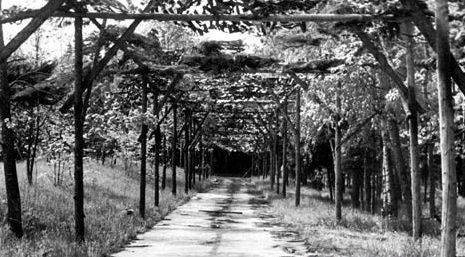
Camouflage nets that hide message paths in Hitler’s bet.
Chapter 4. ORDER NO. 227
05 August 1942.
Volkhov front.
Special Division 327-th SDN 2-th Shock Army.
A young officer, 25 years old, was slowly smoking a cigarette, carelessly shaking the ashes into a makeshift ashtray, which was a can of American stew. On the buttonholes of his new form, there were three enamel rectangles - together with the new assignment, an officer in a special department of the 327 Infantry Division, he was recently awarded the title of captain of state security. Having made a few more puffs, he finally tore his eyes away from the text of the report and looked at the obviously exhausted man sitting in front of him in a faded old tunic, without any insignia.
“Listen, Orlov,” tilting his head to one side and looking around again at the interrogated person, the security officer said in his address. - Your story is certainly very entertaining, but absolutely implausible.
- I told and described in the report everything as it was. I have nothing more to add, ”an employee of the special department heard in response to his remark.
The captain slowly got up from his chair, walked around the table and sat on its edge right in front of the interviewee.
- So you, Major Orlov Alexander Yuryevich, the commander of the battalion, together with other parts of the 2 shock army, were surrounded by Meat Bor, as a result of which you were taken to German captivity. Then, with your own words, you and ten of your fighters managed to escape from captivity, walk several tens of kilometers through forests and swamps, cross the front line, and return safely to the location of our troops in the 27 Army Western Front?
“There were nine fighters with whom I managed to escape from captivity, ten with me,” Orlov replied, lifting his head and looking into the eyes of the special person. - I managed to get to my own only three more, the rest died. What did we eat? The same as under Meat Bor, being surrounded by grass roots and tree bark ... And of course, if we couldn’t grab a German supply chain car, which had accidentally lagged behind its column, where we found the map and products, failed…
There was silence in the dugout for a while. The captain returned to his desk and, opening the tablet lying on the desk, took out a piece of paper with some text printed on it.
- Order No. 227 from 28.07.42 (7). Read, - with these words he threw a piece of paper on the edge of the table.
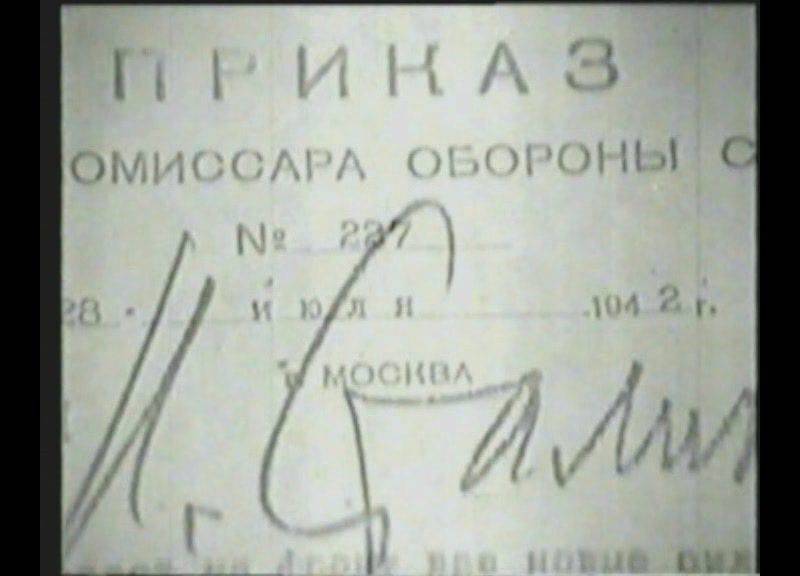
Order number 227 from 28.07.1942, became one of the most famous and significant document of the war.
(7) - The Order of the USSR People's Commissar of Defense No. 227 of 28 in July 1942, which received the unofficial name “Not one step back” among the troops, was a necessary measure of the Soviet leadership. It was aimed at strengthening discipline in the units of the Red Army, strongly shaken after extremely unsuccessful hostilities in the spring and summer of 1942, especially in the south of the country. And although it was precisely this order that led to the creation of barrage detachments, the appearance of penal companies and battalions, many of the commanders of the Red Army and the soldiers themselves, war veterans, rated it as essential and even, in some cases, were forced to admit similar document much earlier.
Orlov took the paper and carefully studied its contents for several minutes. Then, returning the paper, he said:
- This Order is primarily about the unauthorized withdrawal from their positions. My own battalion retreated from its positions with combat, fulfilling the order, - Orlov lowered his voice and looked away. “It’s not our fault that we could not pierce the German encirclement ring because of the difficult terrain, the physical exhaustion of the soldiers, the strong barrage of the enemy and the almost complete lack of ammunition by that time ...”
- Here is how! And about cowardice and anxiety is not in question in the Order ?! - shouted the captain of state security, hitting his fist on the table. - The surrender to the enemy of the major of the Red Army is not a vivid example of such cowardice? The loss of the entire battalion by the commander, who appeared alive in the disposition of his units, does not deserve severe punishment? Where was your last cartridge that every Red Army commander should keep for himself?
“I sent my last patron to the German light when, as a result of the breakthrough, we were in their trenches, where we had to engage in close combat and hand-to-hand combat,” the major answered calmly and firmly. - And about the fact that I managed to survive ... Remember, captain - the dead do not win. And we must survive and win! And let a handful of us remain, we can still cling to the throat of this Nazi reptile!
The person was silent for a while. Then, taking out a new cigarette and lighting a cigarette, he again rose from the table and slowly walked around the room in a circle, apparently thinking about something. Finally he stopped and asked the next question.
- What do you know about the fate of the army commander, General Vlasov?
“I don’t have any reliable information about him,” the major looked away again. “However, a German officer who interrogated me in captivity, after my refusal to cooperate, stated as an example that on July 11 of the year, in the village of Tukhovezhi, General Vlasov, the commander of the 1942 shock army, agreed to work on them.
After that, the captain paused for some time, then, in spite of the major, said hollowly:
“Orlov, even if the fact that you did not accept the offer of the Germans to work for them and really managed to escape from captivity and go out to your own, will be true - and this also requires additional verification - all the same, the order is an order. I am sending your case to a military tribunal. Most likely, you are waiting for a demotion in the rank and file, the deprivation of all orders and medals. For further service, you will be sent to a separate penal battalion formed at the front where you will have to atone for your homeland with blood.
The last phrase of the state security officer sounded deliberately false. Orlov looked at him, sighed and chuckled slightly.
- Captain, let me then at least say goodbye to your fighters. And then go and bathe my guilt.
The officer from such a familiarity was almost taken aback. He turned sharply to the major, with a clear desire to refuse him harshly. But, meeting his eyes with Orlov, he suddenly changed his mind.
- The location of the part does not leave. Come to me tomorrow, exactly at six o'clock in the morning. You should have only the most necessary things with you. As long as you can be free, ”the captain finished, turning his back to the major.
An hour later, Orlov approached the dugout, where he was placed with the fighters who had left the encirclement with him. He was noticed by Sergeant Malrusin, who repaired the tree-earthen fence - the soldiers built them in conditions of peat bogs and swamps around, instead of the usual trench.
- Tt-comrade Major, the work to strengthen the x-moves messages zzz-finished. The personnel of Mr. prepare for rest, - coming forward to meet the major, he reported. Since childhood, the sergeant stuttered a little, so sometimes even a brief report was much longer than the allotted time.
“Well, Andrei,” said Orlov, patting him lightly on the shoulder.
- W-what is there, in the Special Section? - Malrusin anxiously looked at the commander.
“Everything is fine, they are sending me for a three-month rest to a good officer sanatorium,” Orlov replied, grinning. Confusedly, the sergeant, not understanding whether the commander was joking or speaking seriously, looked at the major - but instead of an explanation, he slapped him on the shoulder once more and slightly pushed him to the entrance to the dugout. “Let's go to the others,” he said.
In a small dugout the air was damp. From the floor, covered with pine branches, rose a pleasant coniferous smell. Along the wall of the room was equipped a number of earth bunk, on which, on top of a layer of hay, lay a raincoat. In the center of the dugout stood a hastily shot down from planks and scraps of tree trunks, a large table. On one side of the table there was a log bench, on the other hand wooden boxes were fitted for seating. On the table smoked a sleeve from under a shell of a forty-five shell - in its dim light, the headman Ryabtsev, who was sitting at the table, was darning his tunic. Private Kotsot, who had fallen down on the bench next to the foreman, with a small remnant of a pencil, was diligently drawing something on a piece of paper — apparently, he wrote a letter to his relatives. Noticing the major entered, the men stood at attention.
“At ease, guys, at ease,” said the major, walking up to the table and taking the duffel bag off his shoulder. Having untied it, the major began to reach out and spread the stew, bread, and sugar on the table. The last item removed from the bag and put on the table was a large flask of alcohol.
- Where, Comrade Major? - asked Kotzot in surprise.
“I have not yet had time to take me off the officer's allowance — so I trotted the quartermaster service a little,” Orlov replied. “Moreover, today we have a reason,” he paused and added, “we will say goodbye.”
The soldiers, tearing their eyes away from the products lying on the table, silently looked at their commander. More recently, when, after so many weeks of fighting, captivity, and torment, they came to their own, it seemed to them that soon they would again go under battle under his command, finally break through to the Leningrad residents, avenge their dead friends and comrades. But now, looking at the sadness reflected in Orlov’s eyes, they realized that everything would be completely different.
The settled silence decided to break Malrusin.
“T-comrade major, p-permit me to invite the guests then,” the sergeant smiled mysteriously.
- What kind of guests? - turning to him and slyly squinting in response, asked the major. - Although, knowing you, it seems, I guess.
“Why, the medical battalion is not far from here,” said Malrusin almost without a hint, and nodded his head, as if indicating a direction. - I went there to do the dressing, well, and nn-met with someone ...
Smiles appeared on the faces of the fighters and the commander.
“Well, come on, bring“ somebody ”to us,” said Orlov, laughing. - Only quickly, one leg is here, the other is there. And while we lay the table ...
After about half an hour, having tried to set the table for reception as accurately as possible for the guests, the major and his subordinates finished the final preparations for their meeting.
- So how many will there be, together with us, Comrade Major? - asked Orlov Kotzot, putting several mugs on the table. - At least he said, or something.
“Well, our Malrusin usually likes to meet two girls,” while cutting the bread into large pieces and smiling, the foreman answered for the commander. - What would happen if one fails with one, with the second try the novel spin. Increases the probability of hitting the target, so to speak ...
“Okay, everything seems to be ready,” said Orlov, glancing around at the prepared table. - You can occupy seats, as they say, according to the purchased tickets.
At that moment, steps were heard at the entrance. A few seconds later, two young nurses entered the dugout, one after the other. Behind them, obviously pleased with himself, came Malrusin.
“Here, comrade major, these are our guests,” he said.
In appearance, the girls were no more than 17-18 years old. Their slender figures looked so fragile that even the smallest sizes of tunics in which they were dressed looked too loose on them. One of the girls was a green-eyed brunette with long hair gathered at the back, the second, from behind the field cap, hung not very long light brown curls, and her big gray eyes were looking directly at Orlova. For a moment, the major caught himself thinking that he rarely had to see such beautiful eyes before.
“Good morning, Comrade Major,” the brunette said, embarrassed and quietly.
- Hello girls, hello, - Orlov tried to give his voice as much simplicity as possible. - Come in, do not be shy. We are very happy with the fighters that you agreed to accept our invitation.
The nurses walked closer to the table. As soon as the men helped them to take the places prepared for them, Malrusin immediately appeared between the girls again.
“So, meet me,” he continued cheerfully. - This beautiful brunette is called Catherine, and this not less charming blonde Anastasia.
- Actually, Andrei is a modest guy, but if he becomes talkative, especially with girls, then he is difficult to stop. - looking at the sergeant, said Orlov. “Since you, Catherine, are now between two Andrews,” the major pointed at Private Kotzot with a nod, “You can make a wish.” And for the time being, Igor and I will spill the “Narkomovsky” ones, ”he handed the flask to foreman Ryabtsev.
“Comrade Major, we don’t drink at all,” said Anastasia, and again looked Orlov right in the eyes.
He smiled again.
- And we do not force anyone. But, if at least symbolically join, we will not object.
The girls exchanged glances, then, carefully, they nevertheless pushed their circles to the major. Eagles, keeping his promise, only slightly splashed some alcohol on their bottom. After that, rising, he looked around at his soldiers.
“Unfortunately, the reason why we have gathered today is far from joyful,” he paused for a moment. - I say goodbye to my fighters, with whom over the past few months I have been through fire and water, hunger and thirst, pain and blood. And I do not know if I will ever be able to see them again.
“Are you being transferred to a different front?” - Catherine, who was sitting closer to him, carefully asked.
“Probably Katyusha, you can say that,” answered Orlov evasively. - Anyway. Let's not talk about sad things. Let's drink for the fact that we are alive, we gathered around this table. Let each of us remember this evening in a close dugout, and those who are destined to live to see our Victory, will remember that day about their fighting friends and girlfriends with whom he walked along the hard roads of war. And especially about those who sacrificed their lives in the name of the lives of others ...
A few hours spent at the table, flew by. The time was approaching eleven in the evening when the girls began to gather to return to the medical and sanitary battalion. Seeing them, Orlov came out of the dugout. Anastasia, who was walking a little ahead of him, paused, listening to distant lonely breaks reaching from the front line. The dark sky on the horizon sometimes lit up yellow-red flashes from these explosions, the rest of it was covered with low, heavy clouds.
“You know, Nastya, I just can’t get used to the fact that there are almost never seen stars,” said Orlov, looking at the night sky above them. “If we were now with us, on the bank of the Donets, a bottomless blue-black sky would open over us, in which billions of stars twinkle in all possible colors ...
- Are you from Ukraine? She asked.
- Does my “South Russian” language betray me? - jokingly, Orlov answered her question with a question.
- To be honest, there is a little bit, - the girl smiled. - But, besides this, I studied well at school and I remember from the geography course that there is such a river in Ukraine - the Seversky Donets. In my opinion, it is somewhere near Kharkov, right?
“Yes, there is such a small town — Raisin, this is my homeland,” the shadow of some memories reflected on the Major’s face. - But now my hometown is occupied by the enemy.
After his words, silence fell for a while.
“But I'm from here,” Anastasia said, trying to distract Orlov from heavy thoughts, “was born in Leningrad. When the war began, they managed to evacuate us to Yaroslavl. I was then 16 years old - Anastasia looked again at the horizon line, where lonely fiery flashes were still visible. “But I decided that I should be at the front, helping our soldiers to free my city from the blockade.” This is how Katya and I this summer asked for volunteers at the medical battalion. At first, we were not taken due to age, but we went to the draft board every day. Then, one day, the military commissar said: “Well, what should I do with you, girls? Okay, go, if you want to help our fighters so much ... ". That's how we got here ...
Their conversation was interrupted by the sound of light, approaching steps. From the darkness appeared the silhouette of a friend of Anastasia.
“Comrade Major, it’s time for us to go,” Catherine said with anxiety in her voice, “I'm sorry, but our bosses are very strict, we should have been at our place half an hour ago ...”
Orlov looked at these two fragile nurses with tenderness and spoke softly:
- Good you are ours, thank you for everything. Let's not say goodbye to meet again soon.
The girls smiled and, taking under the visor, quickly turned around and disappeared into the dark. Orlov was left alone, with his gloomy thoughts. Here are the same young little girls, a medical orderly, before his eyes more than once by some inhuman efforts they dragged from the battlefield, often under shelling, wounded adult men. And how many of them themselves were injured or killed ... What is waiting ahead of Nastya, Katya? Will they survive in this war? He wanted to curse Hitler, Germany, all those who brought suffering, death and destruction to his land.
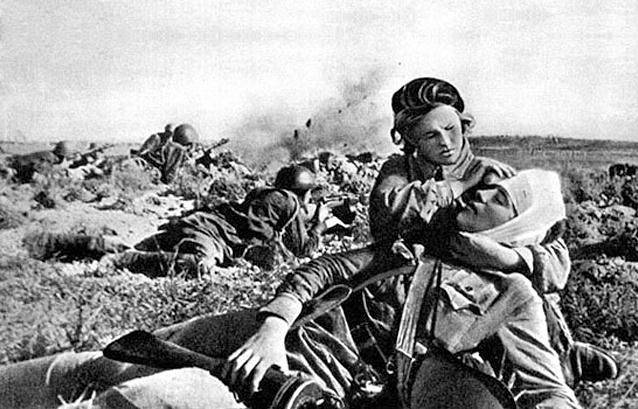
A medical instructor assists a wounded man on the battlefield. Figures speak of the feats of military medics during the years of the Great Patriotic War - more than 50 people among them were awarded the title Heroes of the Soviet Union, 18 became full knights of the Order of Glory. The total number of doctors, medical assistants, orderlies and nurses who were awarded orders and medals was 116 thousand people.
Meanwhile, from the front line, the sounds of continuing single exchanges of artillery strikes were still heard. No one on both sides of the front knew that soon they would have to come together again in a mortal combat, and the outlines of the directions of the upcoming attacks began to appear on the charts and maps in the higher headquarters of the opposing sides ...
Продолжение следует ...
Information